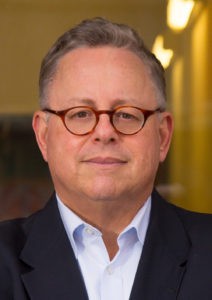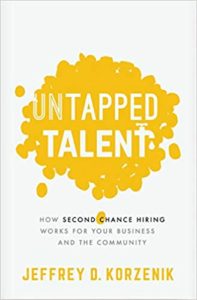When I began my studies of people with criminal records as a potential workforce, I quickly learned that employment is a “necessary but not sufficient” condition. Even low-paying employment reduces recidivism by more than 20%, so a paycheck is critical but does not address the whole spectrum of forces that drive re-offending.
Most of the studies directly relating to recidivism focus on in-prison programming to reduce recidivism. Broadly, these can be categorized in two ways: changing hearts and changing minds.

Jeffrey Korzenik
Paths focusing on changing hearts address many of the characteristics of high-risk re-offenders: antisocial attitudes and personalities, substance abuse, and poor family relations. In technical terms, this would include cognitive behavioral programs that promote self-reflection on the part of participants to understand and change the patterns of thinking and emotion that have led not only to illegal choices, but also have led to broken relationships.
Perhaps unsurprisingly, “changing hearts” seems to be the more critical factor.
Among the most established routes to changing hearts has been the strong tradition of prison ministry in the United States. These have long preceded more recent secular initiatives intended to reduce recidivism. The Prison Fellowship, an organization founded by convicted Watergate conspirator Charles Colson, is among the better known and widely established programs, but many such ministries exist even at the most local level. I have met many returning citizens whose lives were truly changed by prison ministry.
Purpose-driven organizations
Many companies self-identify as purpose-driven organizations, whether or not they adopt any kind of official status. One common such identification I have seen among second-chance employers is a religious orientation, particularly one focused on Christianity. The concepts of original sin, forgiveness and redemption that comprise much of the Christian message are, of course, well suited to a willingness to hire people who have transgressed the law.
When a business leader has a social or religious vision that has not been inculcated throughout the organization, there are pitfalls in trying to implement second-chance hiring.
“The concepts of original sin, forgiveness and redemption that comprise much of the Christian message are, of course, well suited to a willingness to hire people who have transgressed the law.”
One terrific CEO with whom I have collaborated had deeply held Christian beliefs and had committed to giving second chances, placing those with criminal records among his thousands of employees. Unfortunately, some of his executive team believed this was an extracurricular crusade that had no place in the business and fought this initiative, blocking progress. Ultimately this served no one well. The CEO terminated the recalcitrant executives’ employment, and his efforts to build a second-chance hiring program were held back. At the CEO’s request, I brought in the leader of a company with a mature second-chance hiring program, and we worked with the new team and a strong reentry nonprofit to reinvigorate the effort.
Lloyd Martin: The Corporate Executive
There is a reason why most of the business people who have pioneered true second-chance models are CEOs and owners of their companies. Few employees below the C-suite would be given the leeway or take the career risks to continue in the trial-and-error process that has been needed to make second-chance hiring a viable business proposition.
Lloyd Martin is the exception — an executive whose professional credibility and personal values aligned with the values of his employer and commanded the respect of its ownership. Leveraging those tools, he applied an engineer’s mind and a compassionate heart to create a second-chance hiring program across five states.
Lloyd is vice president of manufacturing for CKS Packaging. The family owned company (and Lloyd is not a family member) makes plastic containers in seven states with a large portfolio of household-name customers. CKS considers itself a “covenant company,” a company that in its founding in 1986 was “dedicated to God.” The headquarters, located in Atlanta, includes what they call a War Room, dually used for meetings and prayer.
In a company already deeply involved in ministry to the poor and committed to tithing, Lloyd was in the War Room, praying on how they could do more. He emerged convinced that CKS could help transform lives through employing marginalized workers. He shared with me the story of approaching the company patriarch with his proposal. Lloyd laid out his idea and how he had come to it through prayer. The CEO responded, “If God told you to do this, who am I to stand in the way?”
“The CEO responded, ‘If God told you to do this, who am I to stand in the way?’”
Starting with five homeless men in Atlanta, Lloyd quickly learned the need to make accommodations for workers who had limited experience of working or access to the most basic tools of employment.
In one of his early learning experiences, he understood the need to abandon rigid HR policies, including the traditional “no show, no call, no job” rule. A solid worker from that first cohort did not show and did not call. Rather than terminate the employee, Lloyd sought him out to learn that the employee was ill. The worker had the good judgment to know not to go to work, but never had been taught to call in. And as he reminded Lloyd, “I don’t have a phone; I don’t have any friends with phones.”
Within three years, the program expanded to four states and included more than 200 hires with a background of criminal records, homelessness or addiction.
 Jeffrey Korzenik is chief investment strategist for one of the nation’s largest business banks, where he is responsible for the investment strategy and the allocation of more than $30 billion in assets. A regular guest on CNBC, FOX Business News and Bloomberg TV, his insights into the economy, markets, manufacturing and the workforce are frequently cited in the financial and business press. In recognition of his work on the interaction of the criminal justice system and the labor markets, Korzenik was elected to membership in the Council of Criminal Justice. This column is comprised of select excerpts from his new book, Untapped Talent: How Second Chance Hiring Works for Your Business and the Community, published by HarperCollins Leadership, © 2021. This content is reproduced here with the publisher’s permission.
Jeffrey Korzenik is chief investment strategist for one of the nation’s largest business banks, where he is responsible for the investment strategy and the allocation of more than $30 billion in assets. A regular guest on CNBC, FOX Business News and Bloomberg TV, his insights into the economy, markets, manufacturing and the workforce are frequently cited in the financial and business press. In recognition of his work on the interaction of the criminal justice system and the labor markets, Korzenik was elected to membership in the Council of Criminal Justice. This column is comprised of select excerpts from his new book, Untapped Talent: How Second Chance Hiring Works for Your Business and the Community, published by HarperCollins Leadership, © 2021. This content is reproduced here with the publisher’s permission.


